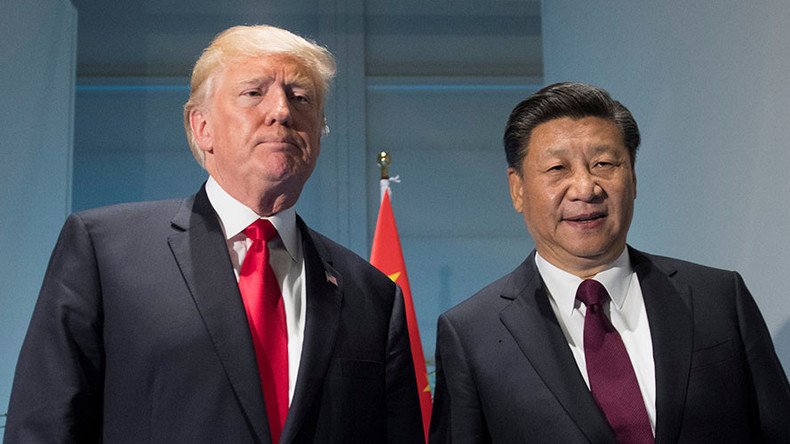What America stands to lose from Trump’s threatened China embargo

As US President Donald Trump threatens to end his country’s dealings with North Korea’s trade partners, a closer look at the substance of the president’s latest Twitter-delivered policy plan reveals the grave damage it would do to the US economy.
In another in a bizarre series of tweets, Trump labelled North Korea “an embarrassment to China” and took aim at allies South Korea, accusing Seoul of trying to ‘appease’ its northern neighbors.
The threat of ending trade relations with “any country doing business with North Korea” once again raises the prospect of a potentially-disastrous trade war between the US and China.
..North Korea is a rogue nation which has become a great threat and embarrassment to China, which is trying to help but with little success.
— Donald J. Trump (@realDonaldTrump) September 3, 2017
The United States is considering, in addition to other options, stopping all trade with any country doing business with North Korea.
— Donald J. Trump (@realDonaldTrump) September 3, 2017
China receives 90 percent of the goods in North Korea’s $2.83 billion-a-year export trade, making it “North Korea’s only economic backer of any importance,” according to Nicholas Eberstadt, senior fellow at the American Enterprise Institute.
According to the Observatory of Economic Complexity, North Korea has the 119th largest economy in the world, with China leading India, Pakistan, Russia, Thailand and the Philippines as their largest trade partner.
It’s not known how the prospect of further sanctions will impact North Korea.
While Pyongyang imports most of its food and energy supplies from its neighbor, China’s imports from North Korea are mostly made up of seafood, textiles and the minerals. Coal briquettes are Pyongyang’s top export, providing the government coffers with $951 million per year.
The latest UN sanctions imposed on North Korea target its key exports including coal, iron, iron ore, lead, lead ore and seafood.
According to the Council on Foreign Relations, the secretive state’s trade with China rose nearly 40 percent this year compared with the same period in 2016, this despite a noticeable cooling of relations between Beijing and Pyongyang.
China also provide the vast majority of food aid. Since 1995, China, along with Japan, South Korea and the US, have provided more than 75 percent of food aid to North Korea. As relations with all other food aid contributors has deteriorated, only China’s contribution has remained consistent.
#Trump will be ‘deposed immediately’ if he blocks trade with China over N. Korea – #Assangehttps://t.co/Sab5l50dzj
— RT (@RT_com) September 4, 2017
It’s feared that any move by the US to cut off trade relations with China, the third-largest destination for its goods and services, would precipitate a global economic meltdown.
More immediately, however, it’s forecast that a trade embargo would have a catastrophic impact on the US labor and retail markets.
According to the US-China Business Council, the two countries’ trade relationship is said to support roughly 2.6 million jobs across a number of industries in the US. In total, the two countries traded $578 billion-worth of goods in 2016.
In comparison, Forbes reported that trade between the US and India, North Korea’s other main trading partner, is worth a total of $68 billion.
There is also a significant trade imbalance between the countries.
Last year, the US imported $462 billion in Chinese goods and exported $115 billion in goods to China, according to the Census Bureau at the US Department of Commerce.
Trump: US ready to use ‘nuclear capabilities’ to defend itself & allies from N. Korea https://t.co/LCNuQbBJxh
— RT (@RT_com) September 4, 2017
China also owns an estimated $1.3 trillion in US Treasury bills, notes and bonds, making it the number one investor among foreign governments. US domestic investors, including individuals and corporations, as well as Federal and local government, make up two thirds of all holders of Treasuries.
According to The Economist, any attempt to not repay their Treasuries holdings to China – by default, or in this instance, a sweeping embargo – would result in “cataclysmic consequences for the economy.”
The confluence of events on the Korean peninsula may be Trump’s chance to correct what he has long seen as an unfair trading arrangement with China, a gripe which he made a central pillar to his unlikely run to the presidency in 2016.












